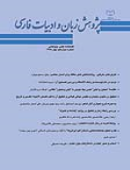گزینش، پذیرش و ویژگیهای فرستاده (سفیر) در شاهنامۀ فردوسی
محورهای موضوعی : پژوهشهای ادبیات کلاسیک ایرانمحمد بیگدلو 1 * , فریده وجدانی 2
1 - دانشگاه ارومیه
2 -
کلید واژه: شاهنامه فردوسی فرستاده سفارت سفیر,
چکیده مقاله :
«فرستاده» در مفهوم مطلقِ میانجی در نامور نامۀ حکیم توس، جایگاه ویژه و حضوری چشم گیر دارد. مقالۀ حاضر که حاصل بررسی موضوع سفارت در سراسر شاهنامۀ فردوسی است، با استفاده از روش توصیفی- تحلیلی در تبیین مواضع تیره و روشن آن کوشیده است. مواضع تیره یعنی زوایای پنهان و ابعاد مغفولماندۀ امر خطیر سفارت را کاویده و یافتههای نوی را دربارۀ ارکان سهگانۀ آن(فرستنده، فرستاده، پذیرنده) به دست داده است. در مواضع روشنِ سفارت یعنی آنچه کم و بیش در متون دیگر نیز به چشم میخورد، به برجستهسازی نکاتی که تاکنون کمتر مورد توجه قرار گرفته، پرداخته و نشان داده است که فرستاده همواره انتقالدهندۀ صِرف پیام نبوده و از آنجایی که بخش اعظمی از کامیابی فرستنده بستگی به گزینش شخصی شایسته داشته است، در انتخاب فرستاده افزون بر ویژگیهایی نظیر خصوصیات اخلاقی و همسویی روحیۀ وی با پیغامی که حامل آن بوده، حتی به زیبایی ظاهری و تناسب اندام او نیز توجه میشده است. یافتههای مقالۀ حاضر همچنین نشان میدهد که شأن، میزان و حدود اختیار فرستادگان یکسان نبوده است. به فرستادگانِ کاردان در کنار وظایف معمول، اختیار تام تفویض میشده است تا بنا به صلاح دید خویش و اقتضای شرایط، اجازۀ اتخاذ تصمیماتِ از پیش تعیین نشده را داشته باشند. فرستادگان نیز بنا بر آداب رایج و تجربیات و شگردهای شخصی، برای برآمدن مقصود، دقایقی را به کار میبستهاند که در جای خویش شایان توجه است. بررسی تمامی مصادیق پذیرشِ فرستاده در شاهنامۀ فردوسی نشان میدهد که هر چند پذیرفتنِ فرستاده آدابی داشته است، پذیرندۀ وی در تمامی موقعیتها خود را ملزم به رعایت آداب و آیینهای پذیرش نمیدانسته، بلکه پایبندی به آدابِ یادشده تابعی از متغیرهایی همچون دوستانه یا خصمانه بودن روابط طرفین، شأن فرستنده، شأن فرستاده، محتوای پیام و... بوده است و پذیرنده، متناسب با آنها شیوههایی را برای مواجهه با فرستاده برمیگزیده است که به تفصیل دربارۀ آنها سخن خواهیم گفت.
“Ambassador” has a special status in the absolute concept of intermediacy in the Great Book of Hakim-e Tous, Shahnameh of Firdausi. The article reviewed the matter of ambassadorship in allover Shahname and attempted to determine ambiguous and clear viewpoints using a descriptive-analytic method. It explored ambiguous stands i.e. hidden angles and neglected aspects of serious issue of ambassadorship and found new findings about the triple pillars (Sender, Ambassador, Receiver). The article highlighted less studied points regarding clear viewpoints of ambassadorship and showed that the ambassador is not always just a messenger; and since the great part of sender success depends on the selection of a competent ambassador, there were great emphasis on the moralities, and the sympathy of ambassador with the message itself and even his seeming beauty and organs’ symmetry. The findings showed that the status, position and authority limitations of ambassadors were not the same. In addition to routine duties, expert ambassadors had been delegated to make non-determined decision upon their own discretion and condition appropriateness. Ambassadors also applied punctilios based on common customs and personal skills to satisfy the needs of sender which are worth exploring. Reviewing all instances of ambassadors’ acceptance in Shahnameh of Firdausi showed that though there were some special habitudes for accepting the ambassador, the receiver were not forced to follow all habitudes and acceptance orders in all situations, but following orders and habitudes depended on variables like their friendship or hostility relations, the status of sender, the status of ambassador, the message content and so on, and regarding abovementioned issues, the receiver would select some method to encounter with ambassadors, which we will deal with in detail.

